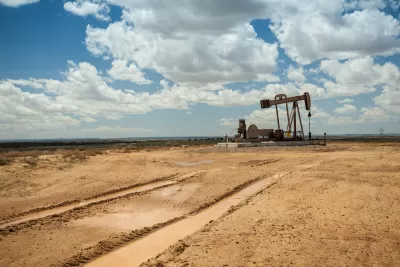New Mexico's HB 361 proposes repurposing depleted oil and gas wells for energy storage and geothermal development, offering a potential solution to both electricity shortages and environmental challenges.

New Mexico is exploring the potential to repurpose its vast number of depleted oil and gas wells for energy storage and geothermal development through HB 361, a bill that recently advanced in the House Energy, Environment and Natural Resources Committee. Sponsored by Rep. Andrea Romero, the bill seeks to encourage innovation while addressing environmental concerns associated with inactive and orphaned wells. One of the primary technologies being considered is mechanical energy storage, a process pioneered by Renewell Energy, which uses a weighted system in water-filled wells to generate electricity during peak demand. As reported by Hannah Grover, while the bill does not establish who will be responsible for decommissioning repurposed wells, it lays the groundwork for rulemaking to determine these responsibilities if the legislation passes.
Supporters of the bill, including representatives from Xcel Energy and energy policy experts, see it as an opportunity to address both electricity shortages and the longstanding problem of abandoned wells. While some regions of New Mexico do not have a direct overlap between geothermal potential and oil and gas activity, the legislation would allow for multiple pathways to repurpose wells for clean energy production. Proponents argue that repurposing wells into energy assets could provide economic benefits while reducing environmental hazards, making it a forward-thinking approach to infrastructure reuse.
Despite bipartisan interest in the concept, some lawmakers, including Rep. Rod Montoya and Rep. Mark Murphy, opposed the bill in its current form, citing concerns over financial assurances and a lack of discussion during interim legislative meetings. However, both expressed a willingness to revisit the idea with further refinements. As New Mexico looks for ways to expand its energy capacity while managing its legacy of inactive wells, HB 361 presents a potentially groundbreaking approach that merges environmental remediation with renewable energy innovation.
FULL STORY: Could depleted oil and gas wells help the electric grid?

Planetizen Federal Action Tracker
A weekly monitor of how Trump’s orders and actions are impacting planners and planning in America.

Congressman Proposes Bill to Rename DC Metro “Trump Train”
The Make Autorail Great Again Act would withhold federal funding to the system until the Washington Metropolitan Area Transit Authority (WMATA), rebrands as the Washington Metropolitan Authority for Greater Access (WMAGA).

The Simple Legislative Tool Transforming Vacant Downtowns
In California, Michigan and Georgia, an easy win is bringing dollars — and delight — back to city centers.

The States Losing Rural Delivery Rooms at an Alarming Pace
In some states, as few as 9% of rural hospitals still deliver babies. As a result, rising pre-term births, no adequate pre-term care and "harrowing" close calls are a growing reality.

The Small South Asian Republic Going all in on EVs
Thanks to one simple policy change less than five years ago, 65% of new cars in this Himalayan country are now electric.

DC Backpedals on Bike Lane Protection, Swaps Barriers for Paint
Citing aesthetic concerns, the city is removing the concrete barriers and flexposts that once separated Arizona Avenue cyclists from motor vehicles.
Urban Design for Planners 1: Software Tools
This six-course series explores essential urban design concepts using open source software and equips planners with the tools they need to participate fully in the urban design process.
Planning for Universal Design
Learn the tools for implementing Universal Design in planning regulations.
Smith Gee Studio
City of Charlotte
City of Camden Redevelopment Agency
City of Astoria
Transportation Research & Education Center (TREC) at Portland State University
US High Speed Rail Association
City of Camden Redevelopment Agency
Municipality of Princeton (NJ)





























